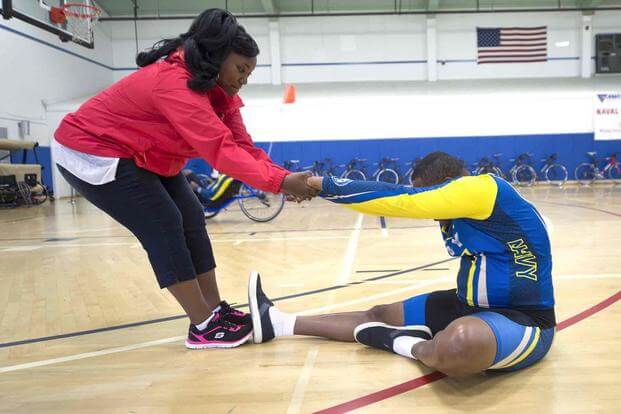A federal court has ruled that caregivers of injured or ill veterans denied financial support and services from the Department of Veterans Affairs can appeal the VA decision to a benefits board, a ruling that could affect thousands of veteran families.
In a unanimous decision issued last week, a panel of judges on the U.S. Court of Appeals for the Federal Circuit upheld a 2021 ruling by a lower court that applicants and participants in the VA's Family Caregiver Program could appeal adverse decisions on their cases.
The VA had maintained that when the Comprehensive Assistance for Family Caregivers Program, also known as the Family Caregiver Program, was created 2010, Congress intended to allow participants to appeal decisions only within the Veterans Health Administration, since the program is managed by the health side of the VA.
Read Next: Veterans' Gun Rights Amendment Included in Compromise Must-Pass VA Spending Bill
The VA also argued that the Board of Veterans' Appeals, or BVA, which is responsible for disputes over disability claims, had no jurisdiction for ruling on caregiver claims.
The appeals court judges disagreed, however. In an opinion issued Feb. 27, Chief Circuit Judge Kimberly Moore and others said that only a narrow group of medical determinations that affect assistance or support are outside the BVA's jurisdiction, and the Family Caregiver Program is not among those few.
"We have considered the parties' remaining arguments and find them unpersuasive," Moore wrote.
The case centered around Jeremy Beaudette, a Marine Corps combat veteran who is legally blind and 100% disabled as result of suffering a traumatic brain injury. He and his wife Maya were enrolled in the program for more than four years but lost their eligibility when Jeremy was unable to attend an in-person assessment while recovering from surgery.
VA employees conducting Jeremy Beaudette's reassessment relied solely on his medical records in deciding to remove him from the program.
The Beaudettes appealed the decision through the VA's clinical appeals process but were denied repeatedly. They then appealed to the VBA, which did not issue a decision nor dismiss it for lack of jurisdiction.
When they didn't receive an answer, the Beaudettes took the case to the U.S. Court of Appeals for Veterans Claims, which ruled in their favor in 2021. The VA then appealed to the federal appeals court, putting any decisions about the Beaudettes' appeal and potentially thousands of others on hold.
Last week's ruling, however, may allow them to proceed if the VA decides to drop the case.
The decision could award thousands of dollars in retroactive pay as well as future compensation, according to the Beaudettes' attorneys from the Public Counsel's Center for Veterans' Advancement, National Veterans Legal Services Program, and Paul Hastings LLP.
"Such review is an important safeguard of fair agency decision-making, and is critical where support for our veterans and their families is concerned," said Igor Timofeyev, a litigation partner for Paul Hastings who argued the appeal.
"This ruling is a monumental victory for injured veterans and their caregivers, who have long endured the challenges and injustices of the Caregiver Program," said Amanda Pertusati, interim directing attorney for Public Counsel, in a statement. "Over the years, our team has received countless calls from frustrated veterans and caregivers impacted by this troubled program."
More than 400,000 veterans and caregivers may be eligible to appeal their cases, according to the National Veterans Legal Services Program.
As of last month, roughly 14,000 veterans and their caregivers have appealed a VA decision on their caregiver program decision or submitted a request for a higher-level review and potentially could be under consideration by the BVA.
As part of the 2021 ruling, the court ordered that all appeals be considered by the BVA and that VA officials should develop a list of applicants who may be eligible to file an appeal. That compilation and follow-on outreach has been on hold since the VA filed an appeal to that ruling.
The program provides health care and benefits, including a stipend, to individuals who support veterans who need assistance and supervision and cannot live independently. The stipends vary based on location, but range from roughly $1,800 to $3,000 a month, depending on the level of care required.
Initially created to support seriously injured or ill post-9/11 veterans, the program was expanded in 2020 to include veterans who served before May 1975 and widened again in 2022 for combat veterans of all eras.
The VA and Justice Department may appeal the ruling to the U.S. Supreme Court. The Justice Department declined to comment on pending litigation. The VA did not respond to a request for comment by publication.
Related: Caregivers of Veterans Spend $11,500 on Average Each Year on Expenses, New Data Shows












